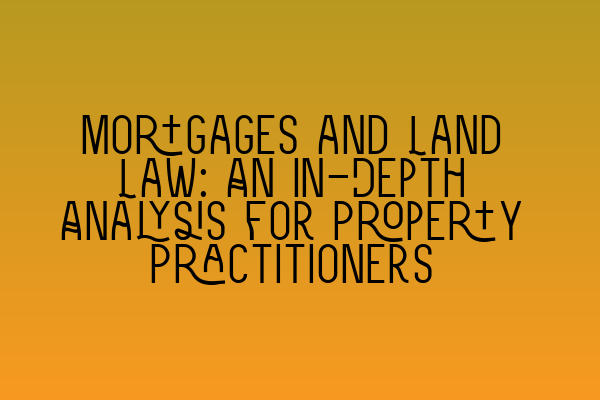Mortgages and Land Law: An In-Depth Analysis for Property Practitioners
Welcome to the SQE Property Law & Land Law blog, where we provide insightful analysis and expert advice for property practitioners. In this article, we will delve into the intricate world of mortgages and land law, exploring the key concepts, legal principles, and practical considerations that solicitors need to be aware of when dealing with mortgage transactions.
Before we delve into the nitty-gritty details of mortgages and land law, it is important to note that successfully navigating this field requires a solid understanding of SQE 1 and SQE 2 examination content. If you’re preparing for the SQE exams, make sure to check out our SQE 1 Practice Exam Questions and SQE 1 Practice Mocks FLK1 FLK2 to enhance your preparation. We also offer comprehensive SQE 2 Preparation Courses and SQE 1 Preparation Courses to help you ace your exams.
Understanding Mortgages
When it comes to property transactions, mortgages play a crucial role. Put simply, a mortgage is a legal instrument by which a borrower obtains a loan secured by the borrower’s property, typically to purchase or refinance real estate. In a mortgage transaction, the borrower (mortgagor) transfers an interest in the property to the lender (mortgagee) as security for the loan.
There are various types of mortgages, including fixed-rate mortgages, adjustable-rate mortgages, and interest-only mortgages. Each type has its own advantages and disadvantages, and it is essential for property practitioners to understand the intricacies of each type to provide effective advice to their clients.
Key Principles in Land Law
In the realm of mortgages and land law, there are several key principles that property practitioners must be well-versed in. These principles include:
- Legal Mortgage: A mortgage must be created by deed and must be properly executed and registered to be valid.
- Equitable Mortgage: An equitable mortgage arises when the borrower and lender have entered into an agreement to create a mortgage, but it has not been executed or registered as a legal mortgage. Property practitioners need to understand when an equitable mortgage may arise and the implications it has on the parties involved.
- Priority: Mortgages can have different priorities based on the order in which they were registered. The concept of priority is crucial in determining the rights and remedies of mortgagees and subsequent purchasers.
- Foreclosure: In the unfortunate event of default by the borrower, the lender has the right to foreclose on the mortgaged property. Property practitioners need to have a deep understanding of the foreclosure process, including the legal requirements, timelines, and potential challenges that may arise.
Practical Considerations for Property Practitioners
Aside from the legal principles, property practitioners must also consider various practical aspects when dealing with mortgage transactions. These include:
- Due Diligence: Ensuring that thorough due diligence is conducted on the property being mortgaged is essential. This involves investigating the title, searching for encumbrances or restrictions, and assessing the property’s value.
- Negotiating Terms: Property practitioners often play a vital role in negotiating the terms and conditions of the mortgage on behalf of their clients. This includes interest rates, repayment terms, and any additional covenants or clauses.
- Documentation: Drafting and reviewing the mortgage documentation is an integral part of the property practitioner’s role. It requires attention to detail, precision, and a thorough understanding of the legal and regulatory requirements.
- Communication and Client Management: Property practitioners must effectively communicate with their clients throughout the mortgage transaction, ensuring that they understand the process, their obligations, and any potential risks involved.
For property practitioners, staying abreast of the latest developments in this complex area of law is crucial. Our SRA SQE Exam Dates article provides key dates and deadlines for the SQE exams, allowing you to plan and prepare effectively.
As a property practitioner, mastering the intricacies of mortgages and land law is essential for providing exceptional legal advice and representation to your clients. By continuously expanding your knowledge and skillset, you can confidently navigate this complex area of law and enhance your professional expertise.
Thank you for reading our in-depth analysis of mortgages and land law for property practitioners. Stay tuned to our SQE Property Law & Land Law blog for more informative articles and expert insights.
